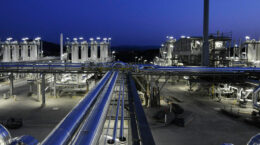International Trade Commission issues final determination that Umicore infringes BASF and Argonne National Laboratory patents
- Commission confirms infringement by Umicore and its customers
- Exclusion order bans importation of Umicore’s infringing lithium metal oxide cathode material into United States
The full International Trade Commission (ITC) has made a final determination that Umicore has infringed on BASF and Argonne National Laboratory’s patents. The order bans in particular the import of Umicore’s infringing nickel-manganese-cobalt (NMC) cathode materials, confirms that lithium-ion batteries containing these materials are infringing, and finds that Umicore is contributing to and inducing its customers’ infringement.
“We are very pleased that the ITC has confirmed the February 29, 2016 ruling of ITC Administrative Law Judge Thomas Pender,” said Kenneth Lane, President of BASF’s global Catalysts division. “This decisive finding highlights that Umicore has been competing unfairly in the market for NMC cathode materials. At BASF, we value innovation and we will continue to enforce and protect our intellectual property in this important area.”
The Commission’s decision confirms Judge Pender’s earlier decision which thoroughly rejected all of Umicore’s arguments. Judge Pender concluded that Umicore’s arguments and witnesses’ testimony were “mischaracterizations,” “misleading,” “not persuasive,” and “simply not credible.” Umicore’s primary scientific argument was that its NMC materials are “single-phase,” rather than two-phase as the patents require. After hearing testimony from six scientific experts and considering transmission electron microscopy and x-ray diffraction analyses on Umicore’s NMC materials, Judge Pender concluded that “I do not find Umicore’s argument credible that its NMC materials are single-phase solid solutions.” BASF and Argonne, according to Judge Pender, “established persuasively” that Umicore’s NMC infringes.
Umicore has continued infringing despite Judge Pender’s decision, and it has even gone so far as telling the media and marketplace that Umicore customers should continue to import products containing Umicore’s infringing NMC cathode materials. However, the full Commission decided that Umicore’s efforts and sales of NMC materials to battery manufacturers and other customers were acts of induced and contributory infringement and confirmed that those who import batteries containing Umicore’s infringing NMC are committing infringement as well. In its exclusion order, the ITC is “prohibiting the unlicensed entry of [infringing] lithium metal oxide cathode materials…that are manufactured by, or on behalf of, or imported by or on behalf of Umicore.”
“Anyone importing products containing Umicore’s infringing NMC without a license is infringing,” said Matthew Lepore, General Counsel for BASF Corporation. “Umicore customers who continue importing infringing products without a license are exposing themselves to enhanced damages for willful patent infringement. The ITC found infringement and the U.S. Patent & Trademark Office and the ITC have confirmed the validity of these patents multiple times. There would be a high likelihood of success in an expedited district court proceeding to block unlicensed imports with a preliminary injunction.”
“BASF is committed to the battery industry and has made significant investments in the research, development and manufacture of NMC cathode materials,” said Jeffrey Lou, Senior Vice President of BASF’s global Battery Materials business. “BASF has NMC manufacturing operations in the United States and in Asia with BASF Toda Battery Materials LLC, a joint venture for producing NMC and Nickel Cobalt Aluminum (NCA) cathode materials.”
“Argonne National Laboratory is proud of its pioneering work in energy storage research. Our NMC cathode technology is just one of many advanced battery material innovations we have worked to create,” said Paul Kearns, Deputy Laboratory Director for Operations and Chief Operations Officer at Argonne National Laboratory.
About BASF’s Catalysts division
BASF’s Catalysts division is the world’s leading supplier of environmental and process catalysts. The group offers exceptional expertise in the development of technologies that protect the air we breathe, produce the fuels that power our world and ensure efficient production of a wide variety of chemicals, plastics and other products, including advanced battery materials. By leveraging our industry-leading R&D platforms, passion for innovation and deep knowledge of precious and base metals, BASF’s Catalysts division develops unique, proprietary solutions that drive customer success. Further information on BASF’s Catalysts division is available on the Internet at www.catalysts.basf.com.
About BASF
BASF Corporation, headquartered in Florham Park, New Jersey, is the North American affiliate of BASF SE, Ludwigshafen, Germany. BASF has nearly 17,500 employees in North America, and had sales of $17.4 billion in 2015. For more information about BASF’s North American operations, visit www.basf.us.
At BASF, we create chemistry for a sustainable future. We combine economic success with environmental protection and social responsibility. The approximately 112,000 employees in the BASF Group work on contributing to the success of our customers in nearly all sectors and almost every country in the world. Our portfolio is organized into five segments: Chemicals, Performance Products, Functional Materials & Solutions, Agricultural Solutions and Oil & Gas. BASF generated sales of more than €70 billion in 2015. BASF shares are traded on the stock exchanges in Frankfurt (BAS), London (BFA) and Zurich (BAS). Further information at www.basf.com.


